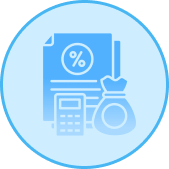Unlock the door to your dream home effortlessly with Buddy Loan! Whether you're a young professional or an experienced homeowner, we offer a flexible repayment tenure of up to 30 years, customized to your age and repayment capacity. Discover the power of choice as we assist you in comparing affordable home loan interest rates and low EMIs. With our hassle-free home loan starting at just 11.99% p.a., Your perfect home is within reach. Apply online now and seize the best option that perfectly matches your financial need!
Table of Contents:
Home Loan Interest Rates vary across banks, housing finance companies (HFCs), and other lenders. These rates may be fixed or floating. Floating home loan interest rates are linked to the Repo Rate, which is currently 5.50% as set by the Reserve Bank of India (RBI)..
Explore our list of top banks and NBFCs to find the best home loan interest rate and select your desired loan amount.
| SL.No. | Bank Home Loans | Interest Rate (p.a.) |
|---|---|---|
| 1. | SBI Home Loan | 7.50%* p.a. Onwards |
| 2. | HDFC Home Loan | 7.90%* p.a. Onwards |
| 3. | ICICI Bank Home Loan | 7.65%* p.a. Onwards |
| 4. | Bank of Baroda Home Loan | 7.45%* p.a. Onwards |
| 5. | Union Bank of India Home Loan | 7.45%*p.a. Onwards |
| 6. | Axis Bank Home Loan | 8.35%* p.a. Onwards |
| 7. | Kotak Mahindra Bank Home Loan | 7.70%* p.a. Onwards |
| 8. | Federal Bank Home Loan | 8.75%* p.a. Onwards |
| 9. | IDFC First Bank Home Loan | 8.85%* p.a. Onwards |
| 10. | Standard Chartered Home Loan | 7.99%* p.a. Onwards |
Read More
Read Less
Note- The interest rates mentioned are subject to change. Do visit the website for more informationChoose your home loan from the below list of top NBFCs and choose among the best interest rates.
| SL.No. | NBFCs Home Loans | Interest Rate (p.a.) |
|---|---|---|
| 1. | Muthoot Finance Home Loan (Muthoot Homefin) |
12.25%* p.a. Onwards |
| 2. | Tata Capital Home Loan | 7.75%* p.a. Onwards |
| 3. | Bajaj Finserv Home Loan | 7.45%* p.a. Onwards |
| 4. | Navi Home Loan | 8.45%* p.a. Onwards |
| 5. | Money View Home Loan | 7.75%* p.a. Onwards |
| 6. | L&T Finance Home Loan | 8.70%* p.a. Onwards |
| 7. | Piramal Finance Home Loan | 9.5%* p.a. Onwards |
Read More
Read Less
Note- The interest rates mentioned are subject to change. Do visit the website for more information.A Home Loan EMI (Equated Monthly Installment) calculator is a useful tool that helps you calculate the monthly payments for your home loan. By considering factors such as the loan amount, interest rate, and loan tenure, this calculator provides an estimate of your EMI.
Using a housing loan EMI calculator is simple. Just input details such as the loan amount, loan period, interest rate, and processing fee, and the calculator will compute your monthly EMI.
Ready to calculate your monthly EMI?
Here is the list of home loan processing fees of top banks.
| Loan Details | Charges |
|---|---|
| Processing Fee | A fee of 1% to 2% will be charged based on the loan amount. |
| Foreclosure/Prepayment Charges |
For floating rate: No charges apply. For fixed rate: 2% to 4% of the outstanding principal. |
| EMI Bounce Charges | Around Rs 400 |
| Overdue Charges on EMI | Late payment charges are 2% per month of the unpaid EMI amount. |
| Legal Fee | Actual legal fees will apply. |
Home loan eligibility differs across lenders and loan schemes. Hence, here is a general set of criteria that must be met in order to be eligible for a home loan.
| Particulars | Eligibility Criteria |
|---|---|
| Nationality |
Indian Residents Non-Resident Indians (NRIs) Persons of Indian Origin (PIOs) |
| Age | 18 years to 70 years |
| Employment |
Salaried with at least 2 years work experience. Self-Employed with at least 3 years of business continuity |
| Credit Score | Minimum 750 and above |
| Minimum Monthly Income | ₹25,000 per month |
| Type of Residence |
Permanent residence Rented residence (must have been residing in the consent place for at least a year) |
Also Check: Home Loan Eligibility Calculator
To apply for a home loan, you need to provide some basic documents as proof of your identity and income. Here’s a list of documents required for a home loan.
Identity Proof (any one)
Driving License/PAN/Voter ID/Valid Passport
Residence Proof (any one)
Copy of Electricity Bill/Water Bill/Telephone Bill
Copy of valid Passport/Aadhaar Card/Driving License
Other Documents
Income Proof Documents
For Self-employed Applicant/Co-applicant
Meet your financial needs with the easiest finance solution and cover all your expenses with Home Loan.

Get flexible
repayment plans.

Extended loan terms
help lower EMI

Get tax deduction on
your home loan

Builds equity and creat
a valuable asset.

Real estate can lead to
long-term financial gains

Faster Documentaion
process for
existing customers
A housing loan is a sum of money borrowed from banks and Housing Finance companies to own a house. To meet your meet you varied home loans or plot loan needs, it is important to have knowledge about the different types of home loans available.
You can select your desired type of home loan mentioned according to your preference.
Home Purchase Loan: Home Purchase loans are loans that can be availed by individuals who want to purchase a piece of land. These loans can be used for construction purposes or as an investment. The maximum loan amount offered by banks is 90% of the present market value of the land, while NBFCs offer 80%.
Home Renovation Loans: Home renovation loans are for you! if you want to renovate, repair or refurnish your homes. These loans are very popular due to their low-interest rates. They can help cover the cost like major repairs and upgrades to the property, and improve the value of the house.
Plot Loans: Plot loans are taken to buy residential properties like flats, row houses, and bungalows. Banks offer a maximum loan amount of 90% of the present market value of the property, while NBFCs offer 80%.
Home Construction Loans: Home construction loans can be availed by individuals who own land and want to construct a new house. The loan can also be used to complete the construction of an unfinished house.
Home Extension Loans: You can avail of a home extension loan if you want to add more space to your home. This loan can assist to fulfill your desire of adding a room or extending the property.
NRI Home Loans: Non - Resident Indians for the construction of a house or the renovation of an old property. These loans can provide maximum tenure of up to 30 years, and the interest rate can be fixed or floating.
Balance Transfer: Home loan balance transfer is a process where an individual transfers an existing home loan from one lender to another to get a lower interest rate. This loan also provides the option of availing a top-up facility from the new lender.
Bridge Loan: Bridge loans are availed by people who want to buy another property by selling off their existing one. These loans help meet short-term fund requirements like a down payment for the new house until the old property is sold off. Bridge loans are generally offered at higher interest rates with a maximum repayment tenure of up to 2 years.
A home loan is a great way to purchase a property. Not only does it help you to own a home but it also offers various tax-saving options. Let's take a look at some of the popular tax-saving schemes that are available with a home loan:
| Tax Saving On | IT Act Section | Description |
|---|---|---|
| Interest Paid | Section 24(b) | Deduction on the interest paid on a home loan. This deduction can be claimed for the interest paid on the loan taken for the purpose of purchase, construction, renovation, or repair of a residential property. |
| Principal Paid | Section 80C | Deduction on the repayment of the principal amount of a home loan. This deduction can be claimed for the amount repaid towards the principal of a home loan during a financial year. |
| First-Time Homebuyer Benefit | Section 80EE | Additional deduction for first-time homebuyers. This deduction is available to first-time homebuyers who have taken a loan on or after April 1, 2013. The deduction is over and above the deduction of Rs 2 lakh under Section 24(b) and Rs 1.5 lakh under Section 80C, and the maximum amount of deduction that can be claimed is Rs 50,000. |
| Affordable Housing Benefit | Section 80EEA | Additional deduction for affordable housing projects. This deduction is available to individuals who have taken a loan for affordable housing on or after April 1, 2019. The deduction is over and above the deduction of Rs 2 lakh under Section 24(b) and Rs 1.5 lakh under Section 80C, and the maximum amount of deduction that can be claimed is Rs 1.5 lakh. |
| Joint Home Loan Benefit | Section 26U | Deduction is available for co-owners of a property with a joint home loan. This deduction is available to co-owners who have jointly taken a home loan. Each co-owner can claim a deduction for the interest paid on the home loan in proportion to their share of ownership in the property. |
| Pre-construction Interest | Section 24(b) | Deduction on pre-construction interest paid in five equal annual installments. This deduction is available on the interest paid during the pre-construction period of a property. The deduction is available in five equal installments starting from the year in which the construction of the property is completed. |
Read More
Read Less
Here are some tips to consider before applying for a home loan:
Check your credit score: Before applying for a home loan, it is important to check your credit score.
Research and compare: It is essential to research and compare different lenders and their interest rates and loan terms.
Assess your affordability: You should have a clear understanding of your affordability and budget for the EMI payments.
Save for a down payment: It is advisable to save for a down payment before applying for a home loan.
Calculate additional expenses: Apart from the loan amount and EMI, there may be additional expenses such as processing fees, legal fees, and stamp duty charges.
Avoid multiple applications: It is not advisable to apply for a home loan with multiple lenders simultaneously.
Read the loan agreement carefully: Before signing the loan agreement, read it carefully and understand all the terms and conditions.
To increase your chances of home loan approval and enhance your eligibility for a preapproved loan, it is important to follow certain guidelines. Here are some essential do's and don'ts to improve your chances of getting a home loan:
| Do's | Don'ts |
|---|---|
| Maintain a good credit score | Avoid the delay of loan payments |
| Save for a down payment | Avoid applying for multiple loans simultaneously |
| Maintain a stable employment history | Avoid switching jobs frequently |
| Reduce existing debt | Avoid taking additional debt |
| Organize required financial documents | Do not provide false information |
Here’s the step-by-step process that you can follow to apply for a home loan on Buddy Loan:
If your home loan application gets rejected, it can be disheartening. However, there are steps you can take to address the situation and increase your chances of future approval. Here are some important actions to consider:
Check Your Credit Score: Obtain a free CIBIL score or credit report to understand your creditworthiness and identify any issues that may have led to the rejection.
Work on Credit Improvement: If your credit score is low, focus on improving it by paying bills and existing debts on time, reducing outstanding balances, and avoiding new credit inquiries.
Reassess Your Financial Situation: Evaluate your financial standing and consider whether it's necessary to enhance your income or decrease your existing debts.
Address Documentation Requirements: Review the home loan documents list provided by the lender and ensure that you have submitted all the necessary documents accurately.
Seek Professional Guidance: Consult with a reputable mortgage broker or financial advisor who can provide insights and guidance on improving your loan eligibility.
Consider getting a Joint Home Loan: Opting for a joint home loan can increase your chances of loan approval. By including a co-applicant with a stable income, you can combine your earnings and improve overall loan eligibility.
A home loan balance transfer, also known as a home loan transfer, refers to the process of transferring an existing home loan from one lender to another. This option allows borrowers to switch their loans to a new lender offering better terms and benefits. Here are some important points to consider regarding home loan balance transfer:
Lower Interest Rates: One of the primary reasons borrowers opt for a home loan balance transfer is to secure a lower interest rate. By switching to a new lender with a more competitive rate, borrowers can save significantly on their monthly payments and overall interest costs.
Improved Loan Terms: Transferring a home loan provides an opportunity to negotiate for improved loan terms such as reduced EMIs, longer repayment tenure, or additional features like a top-up loan facility.
Enhanced Savings: Lower interest rates and improved loan terms result in enhanced savings over the loan tenure, allowing borrowers to better manage their finances.
Repayment of a housing loan, also known as home loan repayment, involves fulfilling your financial obligation towards the loan. There are different options available for borrowers, including pre-payment and part-payment.
Pre-payment allows borrowers to make an early repayment of a lump sum amount, reducing the loan principal and the interest burden.
Part-payment involves making partial repayments towards the principal amount, helping to lower the oerall interest paid and shorten the loan tenure.
Calculating home loan repayments can be done using online calculators or by consulting with your lender. These repayment options provide flexibility and can help borrowers save on interest costs while expediting the loan repayment process.
Taking a home loan can be beneficial if you can afford the payments, plan to stay long-term, interest rates are low, and you qualify for tax benefits. Consider market conditions and alternative investment opportunities.
With Buddy Loan, you can get a home loan online by providing the necessary documents such as income proof, identity proof, address proof, and property documents, and completing the loan application process.
The best age to take a home loan varies for individuals, but generally, it is advisable to apply for a home loan when you have a stable income and can afford the monthly repayments. This is typically in your late 20s to early 40s.
Typically, home loan repayments are made through electronic transfers or checks. Paying in cash may not be feasible or allowed by the lender. It is best to check with your specific lender for their accepted payment methods.
You can clear your home loan faster by making regular prepayments, increasing your EMI amount, opting for shorter loan tenure, and utilizing any bonuses or windfalls to make additional principal payments. Consult with your lender for the specific procedures and terms.
Generally, you can repay your home loan in monthly installments over the loan tenure. However, you can also make prepayments or foreclose the loan earlier if allowed by your lender. The terms and conditions may vary, so it's best to consult your lender for details.
To reduce your home loan amount, you can make regular prepayments, increase your EMI amount, or make lump-sum principal payments when possible. These actions help to lower the outstanding balance and reduce the overall interest you pay.
The percentage of salary eligible for a home loan varies depending on factors like the lender's policies, your income, and other financial obligations. As a general guideline, lenders typically consider loan eligibility based on the applicant's income, ensuring that the EMI does not exceed a certain percentage (usually around 40-50%) of their income.
Generally, having a stable source of income is an important factor for home loan eligibility. However, some lenders may consider other factors such as your creditworthiness, assets, and co-applicants to assess your eligibility. It's best to check with specific lenders for their requirements.
Yes, a housewife can apply for a loan provided she meets the lender's eligibility criteria. Factors such as the applicant's income and creditworthiness will be considered by the lender during the loan application process.
Yes, unmarried girls can take home loans if they meet the lender's eligibility criteria, including having a stable income, a good credit history, and the ability to repay the loan. Lenders generally assess loan applications based on the applicant's financial stability rather than marital status.
While a salary slip is an important document for a home loan application as it provides proof of income, it is not the only document required. Lenders typically require additional documents such as bank statements, income tax returns, employment contract, and identity/address proof to evaluate loan eligibility.
Display of trademarks, tradenames, logos, and other subject matters of Intellectual Property displayed on this website belongs to their respective intellectual property owners & is not owned by Bvalue Services Pvt. Ltd. Display of such Intellectual Property and related product information does not imply, Bvalue Services Pvt. Ltd company’s partnership with the owner of the Intellectual Property or proprietor of such products.
Please read the Terms & Conditions carefully as deemed & proceed at your discretion.